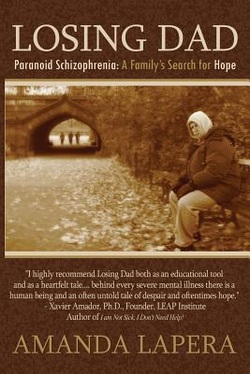
*****
Reviewed for Readers’ Favorite.
Introduction: This review was prepared for Readers’ Favorite, although I would like to add some additional notes to my review posted here. I wanted to take a moment to mention why I chose this book to review.
I do not know if it was due to having seen the 1948 film starring Olivia de Havilland, The Snake Pit, or from reading Will There Really Be a Morning?, the story of Frances Farmer, a movie star who ended up institutionalized, but I have long been intrigued by stories of the mentally ill. On further thought, maybe it was neither of those things. Maybe it was from representing a woman years ago, who may have been mentally ill. . . . In any case, some early experiences left me believing that the worst catastrophe that might strike me personally, would be to have a mental illness or to have a family member who is mentally ill.
Too often in the last decades, there have been stories of catastrophe brought about by mentally ill individuals whose families have been unable to get assistance for them before tragedy struck. Current laws do not allow intervention on behalf of a mentally ill person who does not want help unless that person displays evidence that he is a danger to themselves or others. My heart goes out to the parents and families of those people. Where are they to turn when doctors may not discuss the details of a person’s mental illness unless that person allows it (assuming they are “of age”) but is unable to recognize the need? Where do those families turn when they fear for themselves or others but current laws will not allow them to take action when harm has not yet befallen someone? Where are they to turn when the stigma of mental illness causes them to keep things secret and when the mentally ill person himself may suffer from the inability to recognize his own illness?
Now, to my review--
Tragedy strikes a family when a father and husband, well loved and respected, is diagnosed with cancer, undergoes treatment that does not go smoothly, and is then diagnosed with paranoid schizophrenia, a mental illness that rarely makes its debut in one’s life later than early adulthood. Losing Dad, Paranoid Schizophrenia: A Family’s Search for Hope, is the story of Amanda LaPera’s family, with a forward by Dr. Xavier Amador that discusses “anosognosia,” a condition whereby a person is unable to acknowledge the presence of his own illness and need for treatment.
“Dad” in this story is Joseph, re-married to Hilda and the father of three, who leaves the hospital following treatment for his cancer, a changed man. Eventually disappearing, the family later pieces together the story of what seems to have occurred over a series of years during which Joseph rarely made contact with them. While unable to completely substantiate Joseph’s claims, there is evidence that during his “lost” years, Joseph embarked on a trip involving four continents, thirty countries and thirteen wives. Along the way, he lived on the streets, proselytized to drug dealers and prostitutes and was even hailed a “prophet” by some, but he also lost his family, his career and his lifetime savings.
Amanda LaPera, a vocal advocate for people affected by severe mental illness, has met her goal of raising awareness in this open discussion of her own experiences. She has told a gripping story of fear and loss—of a search for hope—and of love. Losing Dad illustrates the pain felt by families that because of current laws, are unable to help their mentally ill relatives. Closing with a summary of those current laws and how difficult they make it to help a mentally ill loved one unless that person has exhibited that he is a danger to himself or others (which in some cases has come too late to avoid tragedy), LaPera’s book is timely. Parents, families, and even the larger community seek the means to humanely and respectfully assist the mentally ill who are unable to care for themselves and who may act out in their delusions, causing harm to others. The subject is mental illness; the time for discussion, is now.
Reviewed for Readers’ Favorite.
Introduction: This review was prepared for Readers’ Favorite, although I would like to add some additional notes to my review posted here. I wanted to take a moment to mention why I chose this book to review.
I do not know if it was due to having seen the 1948 film starring Olivia de Havilland, The Snake Pit, or from reading Will There Really Be a Morning?, the story of Frances Farmer, a movie star who ended up institutionalized, but I have long been intrigued by stories of the mentally ill. On further thought, maybe it was neither of those things. Maybe it was from representing a woman years ago, who may have been mentally ill. . . . In any case, some early experiences left me believing that the worst catastrophe that might strike me personally, would be to have a mental illness or to have a family member who is mentally ill.
Too often in the last decades, there have been stories of catastrophe brought about by mentally ill individuals whose families have been unable to get assistance for them before tragedy struck. Current laws do not allow intervention on behalf of a mentally ill person who does not want help unless that person displays evidence that he is a danger to themselves or others. My heart goes out to the parents and families of those people. Where are they to turn when doctors may not discuss the details of a person’s mental illness unless that person allows it (assuming they are “of age”) but is unable to recognize the need? Where do those families turn when they fear for themselves or others but current laws will not allow them to take action when harm has not yet befallen someone? Where are they to turn when the stigma of mental illness causes them to keep things secret and when the mentally ill person himself may suffer from the inability to recognize his own illness?
Now, to my review--
Tragedy strikes a family when a father and husband, well loved and respected, is diagnosed with cancer, undergoes treatment that does not go smoothly, and is then diagnosed with paranoid schizophrenia, a mental illness that rarely makes its debut in one’s life later than early adulthood. Losing Dad, Paranoid Schizophrenia: A Family’s Search for Hope, is the story of Amanda LaPera’s family, with a forward by Dr. Xavier Amador that discusses “anosognosia,” a condition whereby a person is unable to acknowledge the presence of his own illness and need for treatment.
“Dad” in this story is Joseph, re-married to Hilda and the father of three, who leaves the hospital following treatment for his cancer, a changed man. Eventually disappearing, the family later pieces together the story of what seems to have occurred over a series of years during which Joseph rarely made contact with them. While unable to completely substantiate Joseph’s claims, there is evidence that during his “lost” years, Joseph embarked on a trip involving four continents, thirty countries and thirteen wives. Along the way, he lived on the streets, proselytized to drug dealers and prostitutes and was even hailed a “prophet” by some, but he also lost his family, his career and his lifetime savings.
Amanda LaPera, a vocal advocate for people affected by severe mental illness, has met her goal of raising awareness in this open discussion of her own experiences. She has told a gripping story of fear and loss—of a search for hope—and of love. Losing Dad illustrates the pain felt by families that because of current laws, are unable to help their mentally ill relatives. Closing with a summary of those current laws and how difficult they make it to help a mentally ill loved one unless that person has exhibited that he is a danger to himself or others (which in some cases has come too late to avoid tragedy), LaPera’s book is timely. Parents, families, and even the larger community seek the means to humanely and respectfully assist the mentally ill who are unable to care for themselves and who may act out in their delusions, causing harm to others. The subject is mental illness; the time for discussion, is now.


